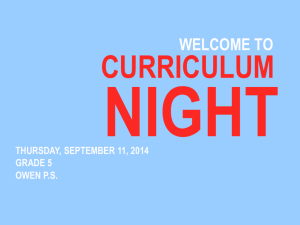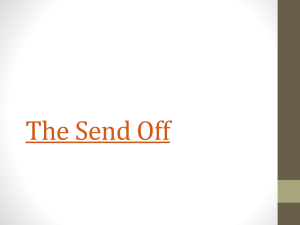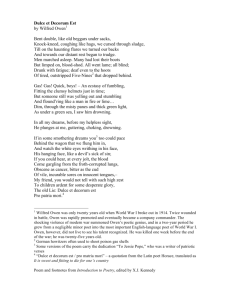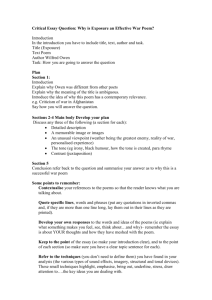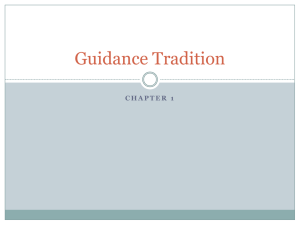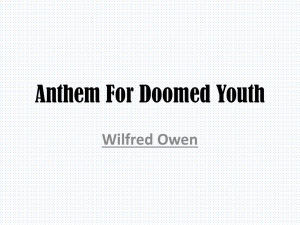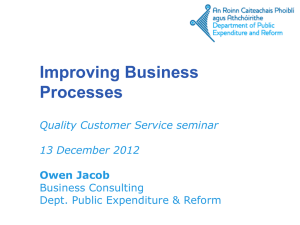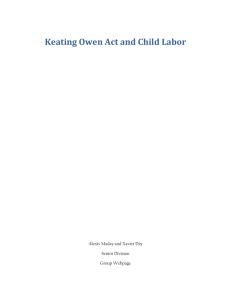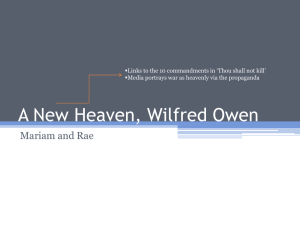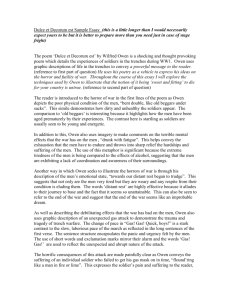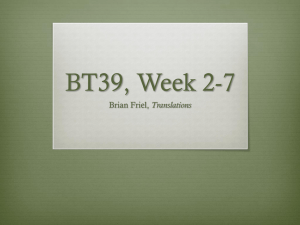We turn back to our dying.
advertisement
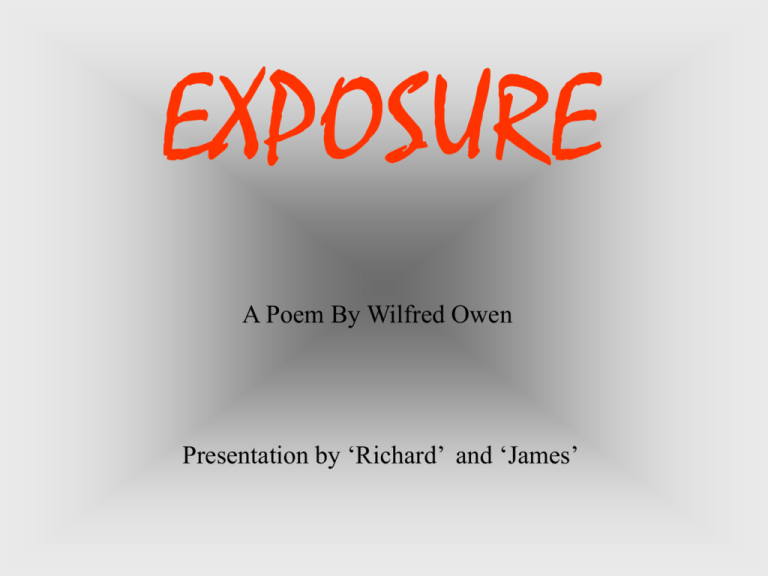
EXPOSURE A Poem By Wilfred Owen Presentation by ‘Richard’ and ‘James’ More personalised A sense of perspective; Owen portrays the conditions from the troops’ perspective Rapid rolling adjectives listed to portray a feeling of n KEY THEME: SILENCE Simile: the wind compared to a sharp knife that pierces the soldiers Our brains ache, in the merciless iced east winds that knive us... Wearied we keep awake because the night is silent... Low, drooping flares confuse our memory of the salient... Worried by silence, sentries whisper, curious, nervous, But nothing happens. ot only suspense but also a blunt Watching, we hear the mad gusts tugging on the wire, way of adding a Like twitching agonies of men among its brambles. sense of Northward, incessantly, the flickering gunnery rumbles, anticlimax, with Far off, like a dull rumour of some other war. following line What are we doing here? highlighted in blue. Again, similes between the conditions and atmosphere and human emotions. ANTICLIMATIC FINAL SENTENCE Expertly introduces a sense of suspense and heightens the inevitable climax at the end of the poem Conditions depicted so vividly by Owen also portrayed by John Nash in his picture ‘Over The Top’. The picture also picks up the eerie unnatural aura of Owen’s poem. Hyperbole exploited by Owen to dramatic effect, similarly to the preceding and succeeding paragraphs, to grab the attention of his audience. Conditions heavily focused upon – recurring theme. The poignant misery of dawn begins to grow... We only know war lasts, rain soaks, and clouds sag stormy. Dawn massing in the east her melancholy army Attacks once more in ranks on shivering ranks of grey, But nothing happens. Alliteration – again to grab the attention of the reader and deliver his metaphor of bullets to birds. COLOUR -Dreary colour Sudden successive flights of bullets streak the silence. - Melancholy Less deathly than the air that shudders black with snow, With sidelong flowing flakes that flock, pause, and renew; We watch them wandering up and down the wind's nonchalance, Wind has a But nothing happens. sense of purpose!?! Personification of conditions; in this case – snow. Structure :- Recurring: most paragraphs consist of; a dramatic first sentence (red), a rapid rolling ‘list’ of emotive adjectives or descriptions (blue) and finally an eerie anticlimax (green.) Reminding us whose perspective this is. “We” – context – collectivism in the trenches and in the army - interdependence. Dramatic hard-hitting sentence, again giving life to conditions, as if Owen is manipulating them or that they have some malevolent intention. Rhetoric – we know they are dying because we can sense there should be some climax to the poem. “quote” “here and there, the red dawn glow…” – some of Owen’s vivid literary portraits are echoed in Sherriff’s“Journey’s End” Pale flakes with fingering stealth come feeling for our facesWe cringe in holes, back on forgotten dreams, and stare, snow-dazed, Deep into grassier ditches. So we drowse, sun-dozed, Littered with blossoms trickling where the blackbird fusses, -Is it that we are dying? Slowly our ghosts drag home: glimpsing the sunk fires, glozed With crusted dark-red jewels; crickets jingle there; For hours the innocent mice rejoice: the house is theirs; Shutters and doors, all closed: on us the doors are closed,We turn back to our dying. Sense that climax is oncoming by showing that the soldiers are reminiscing on past times. “snow-dazed” – “sun-dozed” This both offers contrast but also offers some insight into some of the battle conditions. Subtle references to death – “the innocent mice rejoice; the house is theirs”. It was common knowledge that the soldiers had to share their trenches and dugouts with mice and rats. ? – the same structure is kept throughout; one would expect that there would be some change in the structure either to speed it up to introduce a dramatic climax or simply drag it out to evoke an anticlimax… however Owen doesn’t noticeably vary his approach throughout the poem. Owen depicting the destruction of God’s very own creations in the face of rampant ‘war’, which is almost personified in this penultimate stanza. Since we believe not otherwise can kind fires burn; Nor ever suns smile true on child, or field, or fruit. For God's invincible spring our love is made afraid; Therefore, not loath, we lie out here; therefore were born, For love of God seems dying. Tonight, this frost will fasten on this mud and us, Shrivelling many hands, puckering foreheads crisp. The burying-party, picks and shovels in their shaking grasp, Pause over half-known faces. All their eyes are ice, But nothing happens. THEME: THE INFLUENCE OF GOD ON THE BATTLEFIELD Owen is heavily accentuating this message – the “love of God seems dying”. It would seem the ultimate comment to say that the battlefield extinguishes the very belief in God, as He is helpless in the face of the cackle of gunfire.
